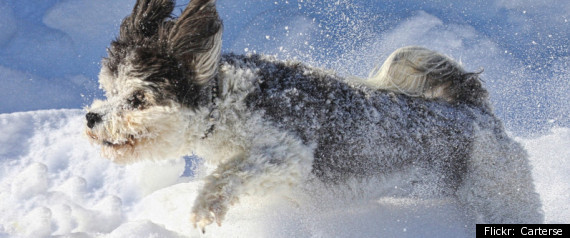Your dog needs special treatment during harsh weather because it can cause adverse affects such as frostbite and dry cracked paws. This can be more than just uncomfortable for your pet!
It’s easy not to think much about outdoor dogs developing frostbite or other conditions due to the cold temperatures, especially since they develop thicker fur. However, they can be affected in the same way we are. The only difference is we can take care of ourselves whereas our pets depend on us.
First, make sure your outdoor pet has a proper outdoor living space.
You want them to be able to get out of inclement weather, especially when temperatures drop drastically before you get home and can let them in the house. I suggest giving them old blankets or bedding to help maintain their body heat.
You may not realize that the very things you do to keep your driveway de-iced and outdoor faucets from freezing can also affect your dog. For example, de-icer contains salt, magnesium or calcium chloride, which can make your pets feet dry and irritated. Not only are these harsh, they can also make your dog sick when they lick their feet.
I recommend finding a non-toxic de-icer if you need to use one. Otherwise you might want to try dog booties (if your dog will leave them on), or wipe their paws with a moist towel and allow to dry before they go back outdoors.
Take care to groom and inspect your dog regularly. Matted and tangled fur can cause your dog to lose much-needed heat. It also won’t protect your dog from the elements as well as a coat that is groomed and untangled. Brush them often; this will stimulate the production of natural oils which help protect your dog.
You’ll also want to check your dog’s paws regularly. Clean them if they have snow and ice between the toes or paw pads. Leaving the snow and ice where it is can lead to your dog developing sores or frostbite. There are wipes specifically developed for use on dogs which will remove any harmful chemicals and condition your dog’s skin.
Trim the hair between their paw pads to minimize any build-up of chemicals or salt. You can also put a layer of petroleum jelly on your dog’s paw pads before they go outdoors and reapply it often to keep their feet healthy.
What you feed your dog during the winter months can also greatly influence their paw and skin care health. Use a high quality diet but don’t make any drastic changes to their diet before getting an okay from the veterinarian. If they approve diet changes, be sure to follow their suggestions on which food to offer.
Don’t bathe your dog during the cold weather if at all possible. Bathing may make your dog smell better, but it also removes essential oils which can lead to dry skin. If you must bathe them, use an oatmeal-based shampoo and moisturizer designed for dogs.
It is vital to keep in mind paw and skin care for your dog during the harsh winter. Your dog is an important part of your family, so keep them safe, warm and happy.

